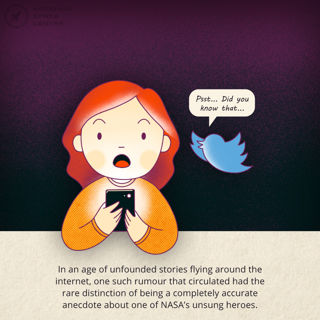
Space Stories: Judith Love Cohen
- 8th Oct 2021
- Author: Alex Thompson
In an age of unfounded stories flying around the internet, one such rumour that circulated not only had the rare distinction of being completely accurate, but also only scratched the surface of the accomplishments of one of NASA’s true unsung heroes of the Apollo era.
This is the story of Judith Love Cohen.
Ballet and Engineering
Born in 1933, Judith Love Cohen set out from an early age to do things girls were simply not expected to do at that time. She had a deep passion for maths and was very good at it, to the point where her fellow classmates would pay her to do their homework for them. As she grew up Cohen realised she was more interested in engineering and studied at college whilst also performing in New York’s Metropolitan Opera Ballet company.
Though this may seem an odd mix, Cohen was used to being unique – as she went through school, she had noticed that she was the only girl in the majority of her maths classes. This continued when she went to study at the University of South California, completing both her Bachelor of Science and Master of Science courses without ever seeing another female engineer. She studied at night whilst working in the day as a junior engineer for North American Aviation. Upon joining NASA, she was one of only a handful of female engineers employed by the space agency at the time. Not that this discouraged her. She later remarked “I had already figured out that I was going to do things that no [other girls] ever did.”
Project Apollo
Cohen worked on many of the first spacecraft in America’s space programme, including Pioneer, where she worked with her first husband, Bud. However, she considered her greatest achievement to be her work on the Apollo missions. Her most important engineering feat was her contribution to the Lunar Module’s Abort Guidance System, which played a critical role in the safe return of the Apollo 13 astronauts after an oxygen tank exploded on their way to the Moon. The return of the astronauts alive and well, is considered one of the most incredible moments in the history of human spaceflight and Cohen was present when the astronauts paid their thanks to the TRW facility for their crucial role in their return.
A Star is Born
It was whilst working on the Abort Guidance System that the story that went viral took place. At the time of the first Moon landings in July 1969, Cohen was already eight months pregnant with her fourth child. On one particular day the following month Cohen came into work as usual when her waters broke. On her way out of the door she grabbed a printout of a problem she’d been working on and continued to work on it whilst in labour. According to another of her children, Neil Siegel, she phoned her boss later that day and “told him she had solved the problem. And… oh yes, the baby was born, too.” The child she gave both to that day was future School of Rock and Jumanji star Jack Black.
Yes really.
Engineer to Author
Cohen continued to work at NASA throughout the 1970s and 80s, working with then-husband (and Black’s dad) Tom as satellite engineers on the Hubble Space Telescope.
Cohen retired as an engineer in 1990 and set up a publishing company Cascade Pass with new husband David Katz. She wrote and published a series of books called “You Can be a Woman….”, which was aimed at young girls and encouraged them to follow various careers in science, with David illustrating. They also published another series that encouraged younger children to practice environmentally friendly exercises called “Green”, and a book named “The Women of Apollo” which featured four biographies of women who had helped put humans on the Moon, including Cohen herself.
Legacy
Judith Love Cohen is much more than an interesting anecdote. She was a mathematician, a dancer, a publisher, a highly talented engineer and an advocate for women in the workplace. Some of the practices we take for granted today, such as internal listings of jobs in companies and formal descriptions for every vacant position, were Cohen’s ideas, with the main purpose being to encourage more women to apply. Upon her passing in 2016, Siegel wrote “she must have influenced tens of thousands of young girls to become interested in professional careers of one sort or another.”
And that is the true legacy of Judith Love Cohen.
Illustrations: Ingrid Faber-Hanabergh is a Graphic Designer at the National Space Centre.






